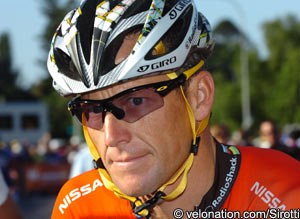Suggestions that Livestrong fundraising could be damaged
 Although the much-publicised investigation into the US Postal Service team has undoubtedly impacted upon Lance Armstrong’s public image, Trek has said that it is standing by its relationship with the former pro.
Although the much-publicised investigation into the US Postal Service team has undoubtedly impacted upon Lance Armstrong’s public image, Trek has said that it is standing by its relationship with the former pro.
The bicycle frame manufacturer began working with Armstrong when he joined the US Postal Service team in 1997. Since then his success has helped the company grow at a rapid rate, making it one of the world’s biggest frame manufacturers.
The company sold 1.5 million bikes last year, generating more than $800 million in sales.
Armstrong has been under increasing pressure due to accusations of doping made by former team-mates Floyd Landis, Tyler Hamilton and others, as well as reports that George Hincapie gave evidence that he, Armstrong and others used banned substances in the past.
Hincapie has denied talking to the recent 60 Minutes programme, but has not contested the claims that he has told investigators of past doping. If he has, his testimony would be very damaging as he is regarded as the most credible of witnesses thus far.
Speaking to the Journal Sentinel, Trek CEO John Burke has made it clear that despite the investigation, the company remains committed to its relationship with Armstrong.
“He’s been a big part of the past and he’s an amazing person. And he will be part of the company into the future,” he said.
“You really have to understand him, and to see the power of him, you need to be around him. There’s something weird that happens when you are around him.
“You can see the bike fans and they go crazy. But it’s the cancer survivors. I’ve been with him a lot. You kind of lay back in the shadows, and it’s intense. That connection with that woman who is sitting there and he was an inspiration in her fight against cancer. That’s a big deal.
“There’s not 4,000 of those people. And there’s not 40,000 and there’s not 400,000. It’s millions.”
Aside from Trek, several other sponsors have also commented on their ongoing relationship. Their responses to questions by Bloomberg is varied, with some pledging full support and others appearing more cautious. Nike remains committed, saying that “our relationship with Lance remains as strong as ever.” It added that the company “does not condone the use of banned substances.”
Nissan spokesman David Reuter told the publication that a 2010 commercial featuring Armstrong was no longer in the company’s rotation, while Bloomberg quoted RadioShack spokesman Eric Bruner as stating in an email that “we recognize the serious nature of the allegations.”
However he added that the company was “proud of the good work we’ve accomplished with Livestrong and Team RadioShack.”
The brand is thought unlikely to extend its sponsorship with the team, however. It’s current deal finishes at the end of the season, and general manager Johan Bruyneel is understood to be searching for a replacement.
Armstrong has also received support from alcohol company Anheuser-Busch, which pays him to promote its Michelob Ultra beer. It said via email that it regarded him as an “extraordinary athlete,” and one who is “admired by millions who lead active lifestyles.”
Could Livestrong be affected?
Outside those core companies, there are however signs that the negative publicity surrounding the investigation plus the serious nature of the allegations are having an effect.
In September of last year, the marketing firm Zeta Interactive said that perception of the Texan has become less positive in recent times. It put his 2008 popularity at 92 percent, but said that it had dropped to 51 percent in August of last year as a result of the federal investigation. The September figures were 55 percent.
Since then many more details have emerged about the investigation and the claims against Armstrong. Amongst the details are that he continued his links with the controversial Italian doctor Michele Ferrari, years after he officially ended his association with him. The mainstream media, which was broadly supportive of Armstrong in the past, has become markedly more questioning about his achievements.
This change of tone has raised concerns that the Livestrong foundation could be affected negatively. Bloomberg reports that the an eventual guilty verdict for Armstrong could cost it $10 million per year.
The publication quoted Doug White, academic director at New York University’s Heyman Center for Philanthropy & Fundraising, as saying that at least 10 percent to 20 percent of that support might be lost if the allegations against Armstrong prove true.
“A lot of support this organization gets is peripheral, that is to say they’re moved by the moment,” he said. “Those people will be the most likely to be affected, the most likely to say, ‘Whoops, this is not good, I’m going to walk away.’”
He said that the fact that Armstrong is so closely linked to Livestrong could make it even more damaging.
Armstrong continues to deny ever having doped, and recently padded out his legal team in anticipation of the battle ahead.